Module 8 Story time 知识点课件(共47张PPT)
文档属性
| 名称 | Module 8 Story time 知识点课件(共47张PPT) | 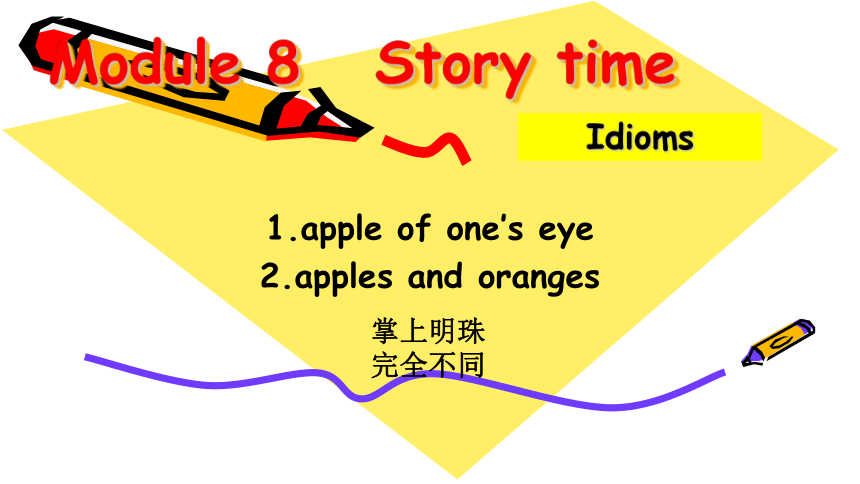 | |
| 格式 | zip | ||
| 文件大小 | 5.8MB | ||
| 资源类型 | 教案 | ||
| 版本资源 | 外研版 | ||
| 科目 | 英语 | ||
| 更新时间 | 2021-07-02 14:13:20 | ||
图片预览

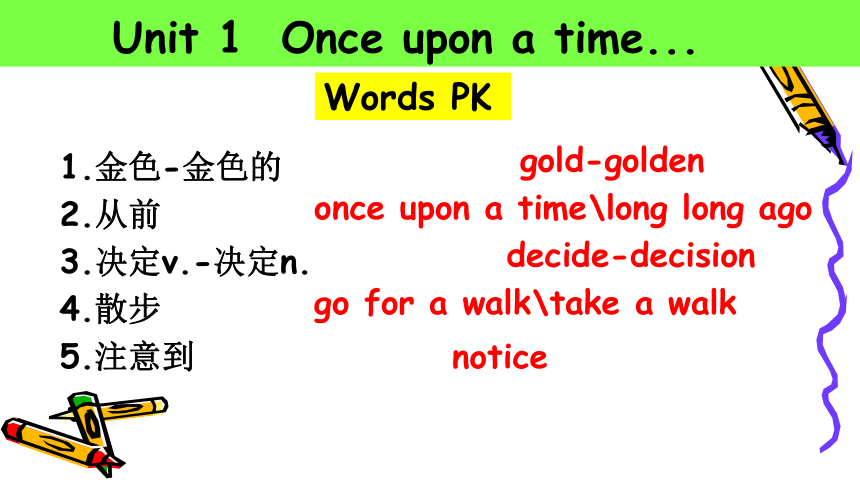
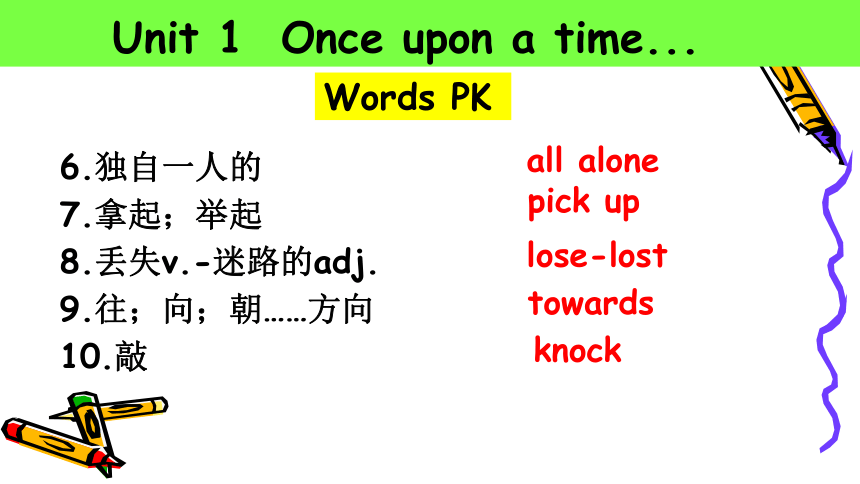
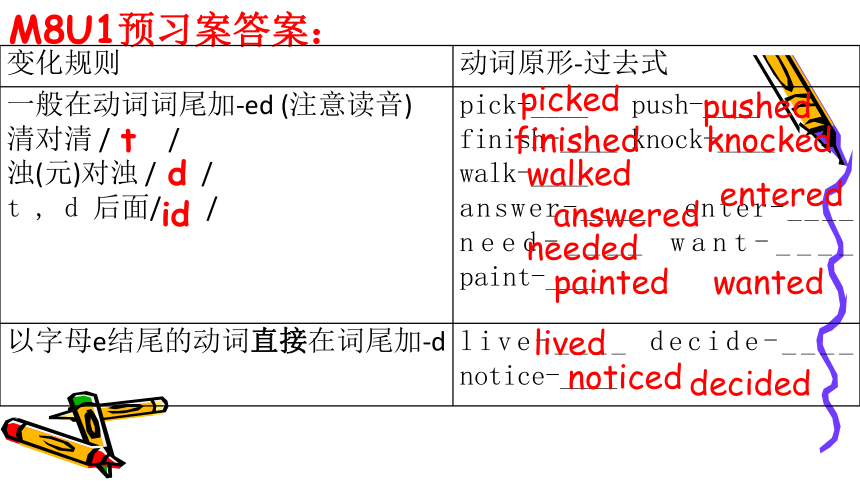
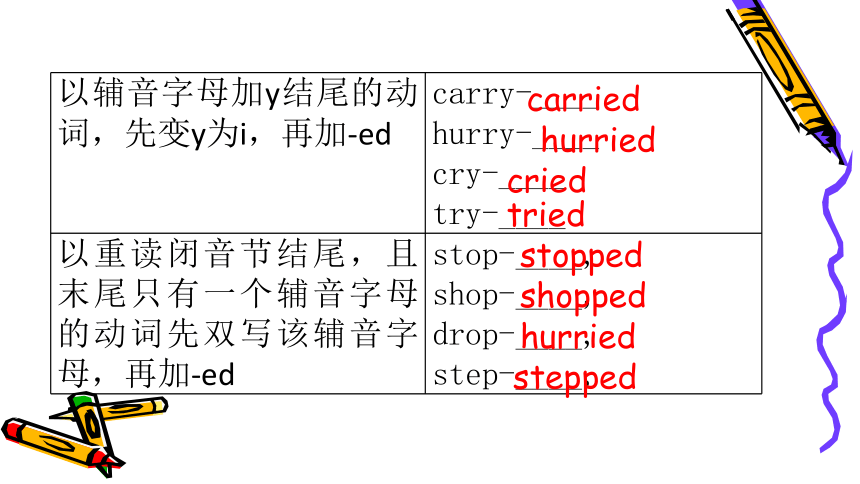
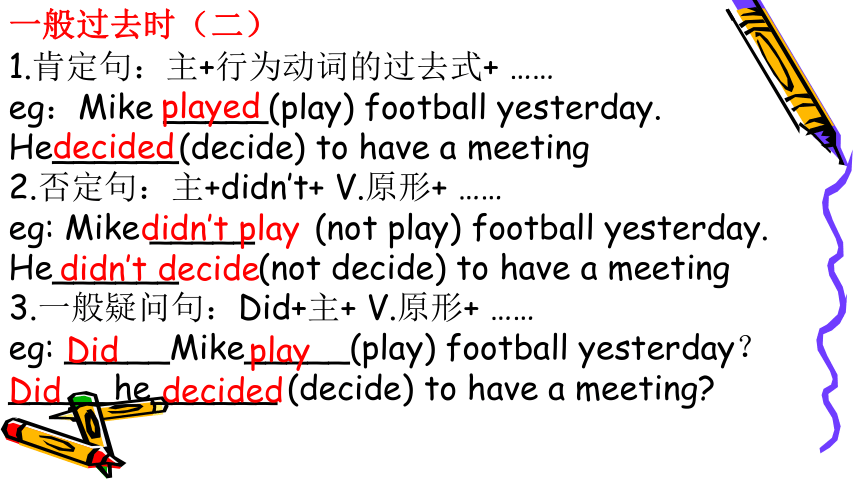
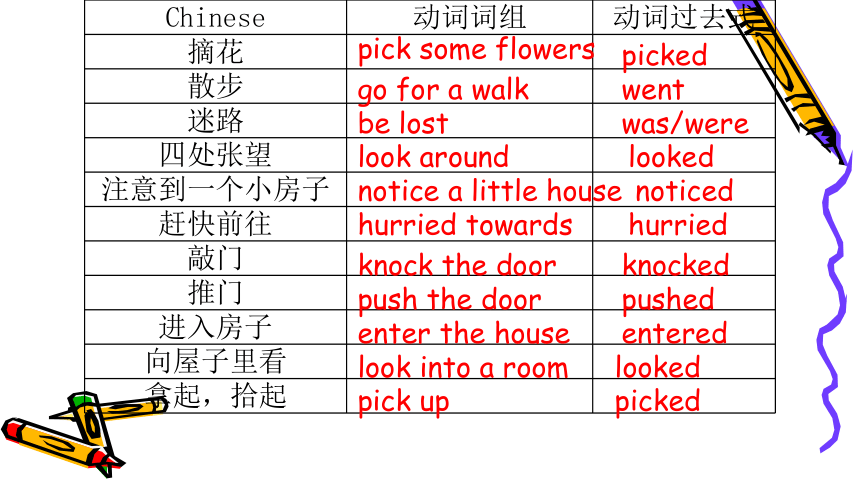
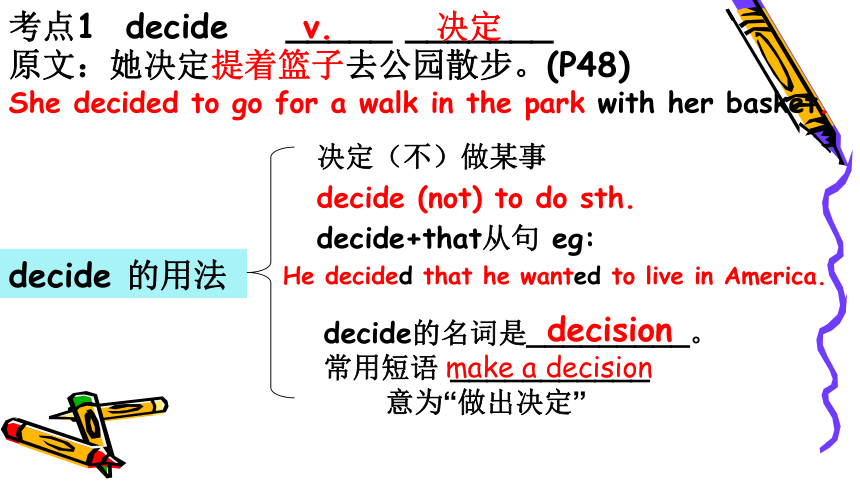
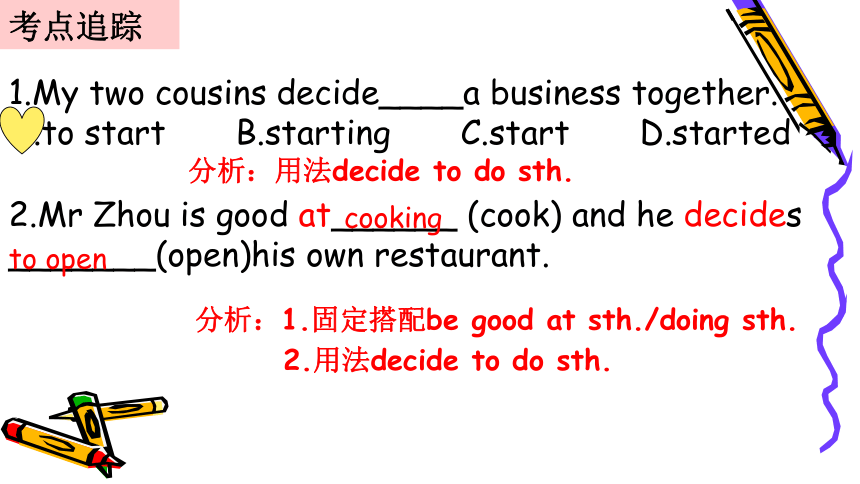
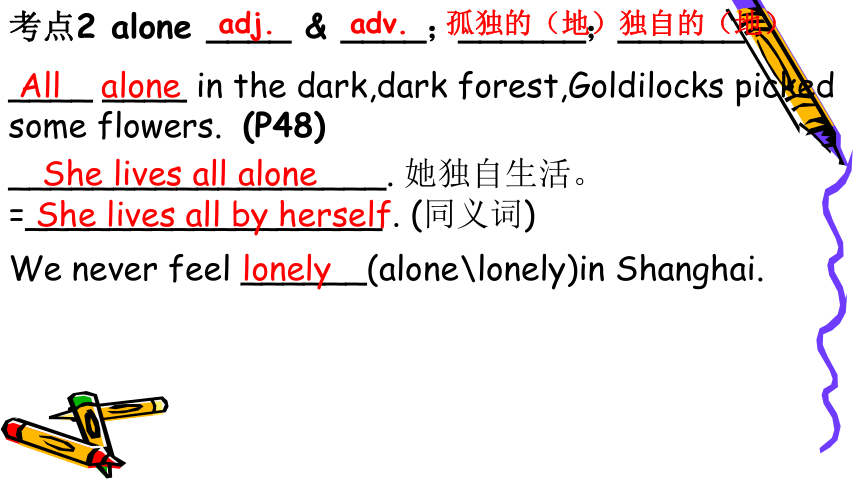
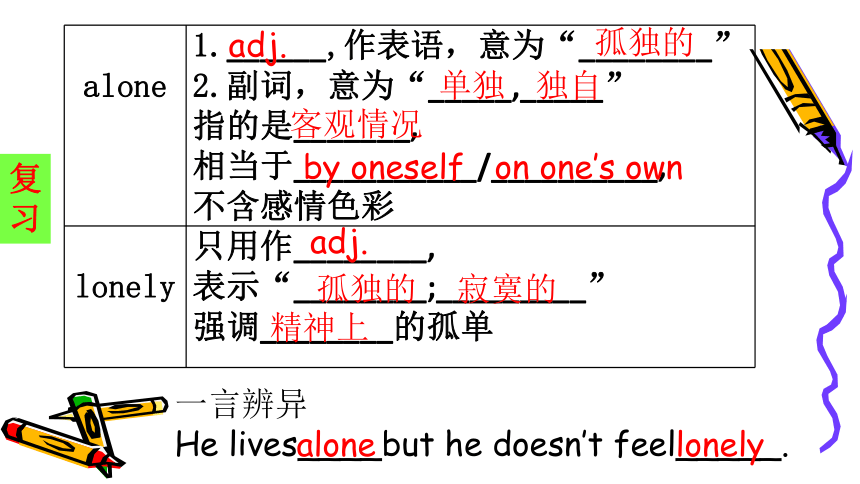
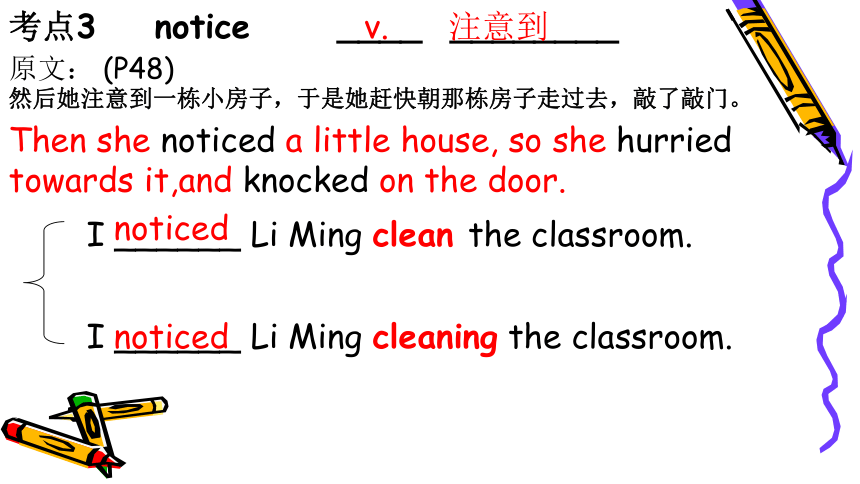
文档简介
(共47张PPT)
Module
8
Story
time
Idioms
1.apple
of
one’s
eye
2.apples
and
oranges
掌上明珠
完全不同
Unit
1
Once
upon
a
time...
Words
PK
1.金色-金色的
gold-golden
2.从前
once
upon
a
time\long
long
ago
3.决定v.-决定n.
decide-decision
4.散步
go
for
a
walk\take
a
walk
5.注意到
notice
Unit
1
Once
upon
a
time...
Words
PK
6.独自一人的
all
alone
7.拿起;举起
pick
up
8.丢失v.-迷路的adj.
lose-lost
9.往;向;朝……方向
towards
10.敲
knock
M8U1预习案答案:
变化规则
动词原形-过去式
一般在动词词尾加-ed
(注意读音)
清对清
/
/
浊(元)对浊
/
/
t
,
d
后面/
/
pick-____
push-____
finish-____
knock-____
walk-____
answer-____
enter-____
need-____
want-____
paint-____
以字母e结尾的动词直接在词尾加-d
live-____
decide-____
notice-____
t
d
id
picked
pushed
finished
knocked
walked
answered
entered
needed
wanted
painted
lived
decided
noticed
以辅音字母加y结尾的动词,先变y为i,再加-ed
carry-____
hurry-____
cry-____
try-____
以重读闭音节结尾,且末尾只有一个辅音字母的动词先双写该辅音字母,再加-ed
stop-____,
shop-____,
drop-____,
step-____,
carried
hurried
cried
tried
stopped
shopped
hurried
stepped
一般过去时(二)
1.肯定句:主+行为动词的过去式+
……
eg:Mike
_____(play)
football
yesterday.
He______(decide)
to
have
a
meeting
2.否定句:主+didn’t+
V.原形+
……
eg:
Mike
_____
(not
play)
football
yesterday.
He______
(not
decide)
to
have
a
meeting
3.一般疑问句:Did+主+
V.原形+
……
eg:
_____Mike_____(play)
football
yesterday?_____he______
(decide)
to
have
a
meeting?
played
decided
didn’t
play
didn’t
decide
Did
play
Did
decided
Chinese
动词词组
动词过去式
摘花
散步
迷路
四处张望
注意到一个小房子
赶快前往
敲门
推门
进入房子
向屋子里看
拿起,拾起
pick
some
flowers
go
for
a
walk
be
lost
look
around
notice
a
little
house
hurried
towards
knock
the
door
push
the
door
enter
the
house
look
into
a
room
pick
up
picked
went
was/were
looked
noticed
hurried
knocked
pushed
entered
looked
picked
考点1
decide
_____
_______
v.
决定
原文:她决定提着篮子去公园散步。(P48)
She
decided
to
go
for
a
walk
in
the
park
with
her
basket.
decide
的用法
决定(不)做某事
decide
(not)
to
do
sth.
decide+that从句
eg:
He
decided
that
he
wanted
to
live
in
America.
decide的名词是_________。
常用短语
___________
意为“做出决定”
decision
make
a
decision
考点追踪
1.My
two
cousins
decide____a
business
together.
A.to
start
B.starting
C.start
D.started
分析:用法decide
to
do
sth.
2.Mr
Zhou
is
good
at______
(cook)
and
he
decides
_______(open)his
own
restaurant.
分析:1.固定搭配be
good
at
sth./doing
sth.
2.用法decide
to
do
sth.
cooking
to
open
考点2
alone
____
&
____;______;______
adj.
adv.
孤独的(地)独自的(地)
____
____
in
the
dark,dark
forest,Goldilocks
picked
some
flowers.
(P48)
All
alone
__________________.
她独自生活。=_________________
.
(同义词)
She
lives
all
alone
She
lives
all
by
herself
We
never
feel
______(alone\lonely)in
Shanghai.
lonely
复习
alone
1.______,作表语,意为“________”
2.副词,意为“_____,_____”
指的是_______,
相当于___________/__________,
不含感彩
lonely
只用作________,
表示“________;_________”
强调________的孤单
adj.
孤独的
单独
独自
客观情况
by
oneself
on
one’s
own
adj.
孤独的
寂寞的
精神上
一言辨异
He
lives____but
he
doesn’t
feel_____.
alone
lonely
考点3
notice
____
________
v.
注意到
原文:
(P48)
然后她注意到一栋小房子,于是她赶快朝那栋房子走过去,敲了敲门。
Then
she
noticed
a
little
house,
so
she
hurried
towards
it,and
knocked
on
the
door.
I
______
Li
Ming
clean
the
classroom.
noticed
I
______
Li
Ming
cleaning
the
classroom.
noticed
notice
sb.
___sth.
“____________________”
(表示:
________________________)
notice
sb.
___sth.
“____________________”
(表示:
________________________)
do
注意到某人做了某事
动作经常发生或注意到全过程
注意到某人正在做某事
强调动作正在发生
doing
考点追踪
I_______her
_______in
the
park.
我注意她正在公园跑步。
I
noticed
the
boy
_______
out
of
the
room.
我注意到男孩跑出去了房间。
noticed
running
堂练典中点P50-51
run
学习目标:
1、能够正确使用下列单词和词组:
piece,
in
pieces,
asleep,
cry,
return,
point,
shout,
at
first,
jump,
without
2、能够读懂本文的故事,明白其中的主要人物和事件以及情节的先后顺序。
3、并能用一般过去时给人讲简单的故事。
Unit
2
Goldilocks
hurried
out
of
the
house.
重难点:
1、能够读懂简单的故事,
明白故事的主要人物、事件和情节。(重点)
2、能够尝试阅读一些简单的英文童话故事,并用一般过去时给人做简单的复述。(难点)
Unit
2
Goldilocks
hurried
out
of
the
house.
M8U2答案解析
Ⅰ.
答案:
1.
without 2.
either 3.
cry 4.
shouted 5.
return
Ⅱ.
答案:
1.
First 2.
asleep 3.
pieces 4.
pointed 5.
without
III.答案:
1~5.
FTTFF
考点1
either
_____
;
_______
adv.
也(不)
语境感悟
1.It
was
not
comfortable
either.
(P50)
2.Jim
can’t
dance.His
friend
Lucy
can’t
either.
3.David
can
play
football
and
John
can
play
football
too/as
well.
4.My
mother
also
likes
music.
either,
too,
also
与
as
well
的区别
either
too
also
as
well
用于否定句句末,加逗号,也可不加
常用于肯定句,一般置于句末,加逗号,也可不加
用于肯定句,位于助动词、be动词或情态动词之后,
实义动词之前
用于肯定句句末,前面不加逗号
考点追踪
他也喜欢游泳。(翻译)
He
____
likes
swimming.
=
He
likes
swimming
_____/_____
_______.
Joe
can’t
speak
Chinese,John
can’t
speak
it,_______.
also
too
as
well
either
考点2
asleep
_____
;
_______
Very
soon
she
was
asleep
in
it.
(P50)
adj.
睡着的
I
was
tired
yesterday,so
I
went
to
sleep
quickly.
She
was
too
tired,so
she
fell
asleep
soon.
辨析
go
to
bed
go
to
sleep
fall
asleep
be
asleep
sleepy
意为“上床睡觉”。指上床前的准备
表示“入睡”的动作,强调动作的结果
意为“入睡”或“不知不觉地睡着了”
表示“睡着,熟睡”的状态
形容词,意为“困倦的”。
考点追踪
I
usually_______
at
9:30
every
night.
He
was
tired,so
he_________quickly
last
night.
Joe_________while
he
was
listening
to
music.
Don’t
make
a
noise.
My
father__________.
My
mother
feels_______after
cleaning
the
garden.
go
to
bed
fell
asleep
went
to
sleep
is
asleep
sleepy
考点3
return
______
______;_______
v.
返回
归还
The
three
Bears
returned.
(P50)
When
did
she
return
home
from
the
trip?
I
returned
the
library
the
book.
=I
returned
the
book
to
the
library
.
return的两种用法
作动词,意为“返回”。
常见搭配:return
to…”返回某地”,
相当于come…to/get
back
to…。
作动词,意为“归还”。
相当于give
back。
其固定结构为:
return
sb.
sth.=return
sth.
to
sb.
归还某人某物
考点4
point
____
____;_____
v.
指向
指
Then
Baby
Bear
pointed
at
the
little
girl
in
his
bed
and
shouted…
(P50)
Please
pointed
at
the
words
while
you
are
reading.
He
pointed
to
the
mountain
covered
by
thick
snow.
堂练典中点P52-53
point
at
与
point
to
的区别
point
at
point
to
所指对象一般是较近的人或物体
所指对象一般是较远的人或物体
学习目标:
1.
正确运用本模块的词汇:hair,
forest,
decide,
go
for
a
walk,
dark,
pick
up,
soon,
little,
door,
answer,
hungry,
right,
in
pieces,
cry,
at
first,
jump等。
2.
能读懂简单的英语童话故事。
3.
能够运用规则的单词过去式给同伴讲一个小故事。
Unit
3
Language
in
use
重难点:
能够根据自己所学,运用规则的单词过去式给同伴讲一个小故事。
Unit
3
Language
in
use
M8U3预习案答案:
I.
答案:
1~5.
DACCA 6~10.
BACAA
II.
答案:
1~5.
CDDAD 6~10.
BCABD
语法探究
含有行为动词的一般过去时
一般过去时的用法
一般过去时的构成
(1)表示过去某时间发生的动作或存在的状态。
(2)表示过去经常性的,习惯性的动作。
(3)一般过去时态的时间状语标志词:
last
night,yesterday,the
day
before
yesterday,last
week,two
years
ago,
in
+
过去年份,in
the
past,
just
now。
句式
结构
肯定句
否定句
一般疑问句
回答
特殊疑问句
主语+行为动词的过去式+其他。
主语+didn’t+行为动词的过去式+其他。
Did+主语+行为动词的原形+其他?
-Yes,主语+did.
-No,主语+didn’t.
特殊疑问词+did+主语+行为动词的原形+其他?
话题分析
本模块话题是“童话故事”。通过学习,我们可以了解丰富多彩的童话故事,也可以运用所学知识自己编写小故事。
写作方法
“三步法”写童话故事
1:____________
2:____________
3:____________
介绍童话里的人物
描述童话里的情节
做出总结
写作技巧
1.讲故事通常用记叙文。
写这种记叙文时,要掌握运用一般过去时描述过去发生的事的技巧。
2.这类文章主要是讲述一个故事,要注意时态和人称。
Goldilocks
and
the
Three
Bears
Once
upon
a
time…
gold
forest
decide
basket
hair
go
for
a
walk
found
entered
was
lost
hurried
noticed
knocked
pushed
finished
picked
Simple
past
tense
时态
Once
upon
a
time
One
day
At
first
And
soon/then
next
later
finally
but
so
they
lived
a
…
life.
From
then
on,
Key
points
of
telling
a
story:(三要点)
1.
Begin
with
Once
upon
a
time…
2.
Use
simple
past
tense,
V-ed.
3.
Use
linking
words,
such
as......
lived,
dwarves小矮人
played/d/,
danced/t/
knocked/t/,
opened/d/
/d/
/dw?:vz/
enjoyed/d/
passed/t/…to递给
died,
cried
/d/
kissed
/t/,
saved
/d/
laughed
/t/,
lived
/d/
sadly
prince王子
happy
/prins/
1.
Snow
White
visited,
walked
picked
showed
up
出现
/id/
/t/
/t/
/?
??d/
swallowed
吞
opened,
saved/d/
died,lived/d/
/?sw?l??d/v.
hunter猎人,belly肚子
happy
sadly
/?h?nt?/n.
/?beli/n.
2.
Little
Red
Riding
Hood
lived,
stepmother继母
cleaned
changed
/d/…into
/d/
/?stepm???/
n.
/d/
witch/wi?/n.女巫
danced,
laughed
/t/
asked,tried
on
found,
lived
enjoyed
/d/
servant
/?s?:v?nt/
n.仆人
happy
prince
/prins/王子
crystal
/kristl/
adj.水晶的
3.
Cinderella
lived,
decided
straw草,
wood木头,
brick砖
blew
away吹散
/d/
/id/
/str?:/
/wud/
/brik/
n.
/blu:/
v.
laughed,
happily
climbed爬,entered
fell
into掉进,
cooked
/t/
/klaimd/
/d/
/fel/
/t/
hid/hid/v.
躲藏
roof/ru:f/n.屋顶,
chimney/??imni/烟囱
4.
Three
Little
Pigs
lived,
gave/geiv/
dropped
into掉进
cried,
sadly
crystal
/kristl/
adj.水晶的
/dr?pt/
/d/
helped,
picked
up
/t/
thanked,kissed
/t/
loved,
lived
/d/
frog/fr?g/n.青蛙
changed
into变成
happy
prince/prins/王子
/d/
5.
The
Frog
Prince
received
worried
about
joined
the
Army
/d/
/d/
/d/
参军
tried,
killed
watched,missed
returned
to,
lived
/d/
/d/
/t/
/t/
/d/
/d/
brave/breiv/adj.勇敢的
enemies
/?en?miz/
n.敌人
happy
6.
Mulan
1
2
3
4
5
6
Show
Time
Sample:
Once
upon
a
time,
there
was
a
…
called…
She/He
was/had…
One
day,
he/she
V-ed……
At
first,
…
and
then….
Later…but….
So…..
Finally….
From
then
on,
they
lived
a
…(adj.)
life.
思维导图:
语言能力
Topic:
Functions:
目标语言
语法聚焦
课文复述
See
You
Next
Time!
Miss
Gao
Module
8
Story
time
Idioms
1.apple
of
one’s
eye
2.apples
and
oranges
掌上明珠
完全不同
Unit
1
Once
upon
a
time...
Words
PK
1.金色-金色的
gold-golden
2.从前
once
upon
a
time\long
long
ago
3.决定v.-决定n.
decide-decision
4.散步
go
for
a
walk\take
a
walk
5.注意到
notice
Unit
1
Once
upon
a
time...
Words
PK
6.独自一人的
all
alone
7.拿起;举起
pick
up
8.丢失v.-迷路的adj.
lose-lost
9.往;向;朝……方向
towards
10.敲
knock
M8U1预习案答案:
变化规则
动词原形-过去式
一般在动词词尾加-ed
(注意读音)
清对清
/
/
浊(元)对浊
/
/
t
,
d
后面/
/
pick-____
push-____
finish-____
knock-____
walk-____
answer-____
enter-____
need-____
want-____
paint-____
以字母e结尾的动词直接在词尾加-d
live-____
decide-____
notice-____
t
d
id
picked
pushed
finished
knocked
walked
answered
entered
needed
wanted
painted
lived
decided
noticed
以辅音字母加y结尾的动词,先变y为i,再加-ed
carry-____
hurry-____
cry-____
try-____
以重读闭音节结尾,且末尾只有一个辅音字母的动词先双写该辅音字母,再加-ed
stop-____,
shop-____,
drop-____,
step-____,
carried
hurried
cried
tried
stopped
shopped
hurried
stepped
一般过去时(二)
1.肯定句:主+行为动词的过去式+
……
eg:Mike
_____(play)
football
yesterday.
He______(decide)
to
have
a
meeting
2.否定句:主+didn’t+
V.原形+
……
eg:
Mike
_____
(not
play)
football
yesterday.
He______
(not
decide)
to
have
a
meeting
3.一般疑问句:Did+主+
V.原形+
……
eg:
_____Mike_____(play)
football
yesterday?_____he______
(decide)
to
have
a
meeting?
played
decided
didn’t
play
didn’t
decide
Did
play
Did
decided
Chinese
动词词组
动词过去式
摘花
散步
迷路
四处张望
注意到一个小房子
赶快前往
敲门
推门
进入房子
向屋子里看
拿起,拾起
pick
some
flowers
go
for
a
walk
be
lost
look
around
notice
a
little
house
hurried
towards
knock
the
door
push
the
door
enter
the
house
look
into
a
room
pick
up
picked
went
was/were
looked
noticed
hurried
knocked
pushed
entered
looked
picked
考点1
decide
_____
_______
v.
决定
原文:她决定提着篮子去公园散步。(P48)
She
decided
to
go
for
a
walk
in
the
park
with
her
basket.
decide
的用法
决定(不)做某事
decide
(not)
to
do
sth.
decide+that从句
eg:
He
decided
that
he
wanted
to
live
in
America.
decide的名词是_________。
常用短语
___________
意为“做出决定”
decision
make
a
decision
考点追踪
1.My
two
cousins
decide____a
business
together.
A.to
start
B.starting
C.start
D.started
分析:用法decide
to
do
sth.
2.Mr
Zhou
is
good
at______
(cook)
and
he
decides
_______(open)his
own
restaurant.
分析:1.固定搭配be
good
at
sth./doing
sth.
2.用法decide
to
do
sth.
cooking
to
open
考点2
alone
____
&
____;______;______
adj.
adv.
孤独的(地)独自的(地)
____
____
in
the
dark,dark
forest,Goldilocks
picked
some
flowers.
(P48)
All
alone
__________________.
她独自生活。=_________________
.
(同义词)
She
lives
all
alone
She
lives
all
by
herself
We
never
feel
______(alone\lonely)in
Shanghai.
lonely
复习
alone
1.______,作表语,意为“________”
2.副词,意为“_____,_____”
指的是_______,
相当于___________/__________,
不含感彩
lonely
只用作________,
表示“________;_________”
强调________的孤单
adj.
孤独的
单独
独自
客观情况
by
oneself
on
one’s
own
adj.
孤独的
寂寞的
精神上
一言辨异
He
lives____but
he
doesn’t
feel_____.
alone
lonely
考点3
notice
____
________
v.
注意到
原文:
(P48)
然后她注意到一栋小房子,于是她赶快朝那栋房子走过去,敲了敲门。
Then
she
noticed
a
little
house,
so
she
hurried
towards
it,and
knocked
on
the
door.
I
______
Li
Ming
clean
the
classroom.
noticed
I
______
Li
Ming
cleaning
the
classroom.
noticed
notice
sb.
___sth.
“____________________”
(表示:
________________________)
notice
sb.
___sth.
“____________________”
(表示:
________________________)
do
注意到某人做了某事
动作经常发生或注意到全过程
注意到某人正在做某事
强调动作正在发生
doing
考点追踪
I_______her
_______in
the
park.
我注意她正在公园跑步。
I
noticed
the
boy
_______
out
of
the
room.
我注意到男孩跑出去了房间。
noticed
running
堂练典中点P50-51
run
学习目标:
1、能够正确使用下列单词和词组:
piece,
in
pieces,
asleep,
cry,
return,
point,
shout,
at
first,
jump,
without
2、能够读懂本文的故事,明白其中的主要人物和事件以及情节的先后顺序。
3、并能用一般过去时给人讲简单的故事。
Unit
2
Goldilocks
hurried
out
of
the
house.
重难点:
1、能够读懂简单的故事,
明白故事的主要人物、事件和情节。(重点)
2、能够尝试阅读一些简单的英文童话故事,并用一般过去时给人做简单的复述。(难点)
Unit
2
Goldilocks
hurried
out
of
the
house.
M8U2答案解析
Ⅰ.
答案:
1.
without 2.
either 3.
cry 4.
shouted 5.
return
Ⅱ.
答案:
1.
First 2.
asleep 3.
pieces 4.
pointed 5.
without
III.答案:
1~5.
FTTFF
考点1
either
_____
;
_______
adv.
也(不)
语境感悟
1.It
was
not
comfortable
either.
(P50)
2.Jim
can’t
dance.His
friend
Lucy
can’t
either.
3.David
can
play
football
and
John
can
play
football
too/as
well.
4.My
mother
also
likes
music.
either,
too,
also
与
as
well
的区别
either
too
also
as
well
用于否定句句末,加逗号,也可不加
常用于肯定句,一般置于句末,加逗号,也可不加
用于肯定句,位于助动词、be动词或情态动词之后,
实义动词之前
用于肯定句句末,前面不加逗号
考点追踪
他也喜欢游泳。(翻译)
He
____
likes
swimming.
=
He
likes
swimming
_____/_____
_______.
Joe
can’t
speak
Chinese,John
can’t
speak
it,_______.
also
too
as
well
either
考点2
asleep
_____
;
_______
Very
soon
she
was
asleep
in
it.
(P50)
adj.
睡着的
I
was
tired
yesterday,so
I
went
to
sleep
quickly.
She
was
too
tired,so
she
fell
asleep
soon.
辨析
go
to
bed
go
to
sleep
fall
asleep
be
asleep
sleepy
意为“上床睡觉”。指上床前的准备
表示“入睡”的动作,强调动作的结果
意为“入睡”或“不知不觉地睡着了”
表示“睡着,熟睡”的状态
形容词,意为“困倦的”。
考点追踪
I
usually_______
at
9:30
every
night.
He
was
tired,so
he_________quickly
last
night.
Joe_________while
he
was
listening
to
music.
Don’t
make
a
noise.
My
father__________.
My
mother
feels_______after
cleaning
the
garden.
go
to
bed
fell
asleep
went
to
sleep
is
asleep
sleepy
考点3
return
______
______;_______
v.
返回
归还
The
three
Bears
returned.
(P50)
When
did
she
return
home
from
the
trip?
I
returned
the
library
the
book.
=I
returned
the
book
to
the
library
.
return的两种用法
作动词,意为“返回”。
常见搭配:return
to…”返回某地”,
相当于come…to/get
back
to…。
作动词,意为“归还”。
相当于give
back。
其固定结构为:
return
sb.
sth.=return
sth.
to
sb.
归还某人某物
考点4
point
____
____;_____
v.
指向
指
Then
Baby
Bear
pointed
at
the
little
girl
in
his
bed
and
shouted…
(P50)
Please
pointed
at
the
words
while
you
are
reading.
He
pointed
to
the
mountain
covered
by
thick
snow.
堂练典中点P52-53
point
at
与
point
to
的区别
point
at
point
to
所指对象一般是较近的人或物体
所指对象一般是较远的人或物体
学习目标:
1.
正确运用本模块的词汇:hair,
forest,
decide,
go
for
a
walk,
dark,
pick
up,
soon,
little,
door,
answer,
hungry,
right,
in
pieces,
cry,
at
first,
jump等。
2.
能读懂简单的英语童话故事。
3.
能够运用规则的单词过去式给同伴讲一个小故事。
Unit
3
Language
in
use
重难点:
能够根据自己所学,运用规则的单词过去式给同伴讲一个小故事。
Unit
3
Language
in
use
M8U3预习案答案:
I.
答案:
1~5.
DACCA 6~10.
BACAA
II.
答案:
1~5.
CDDAD 6~10.
BCABD
语法探究
含有行为动词的一般过去时
一般过去时的用法
一般过去时的构成
(1)表示过去某时间发生的动作或存在的状态。
(2)表示过去经常性的,习惯性的动作。
(3)一般过去时态的时间状语标志词:
last
night,yesterday,the
day
before
yesterday,last
week,two
years
ago,
in
+
过去年份,in
the
past,
just
now。
句式
结构
肯定句
否定句
一般疑问句
回答
特殊疑问句
主语+行为动词的过去式+其他。
主语+didn’t+行为动词的过去式+其他。
Did+主语+行为动词的原形+其他?
-Yes,主语+did.
-No,主语+didn’t.
特殊疑问词+did+主语+行为动词的原形+其他?
话题分析
本模块话题是“童话故事”。通过学习,我们可以了解丰富多彩的童话故事,也可以运用所学知识自己编写小故事。
写作方法
“三步法”写童话故事
1:____________
2:____________
3:____________
介绍童话里的人物
描述童话里的情节
做出总结
写作技巧
1.讲故事通常用记叙文。
写这种记叙文时,要掌握运用一般过去时描述过去发生的事的技巧。
2.这类文章主要是讲述一个故事,要注意时态和人称。
Goldilocks
and
the
Three
Bears
Once
upon
a
time…
gold
forest
decide
basket
hair
go
for
a
walk
found
entered
was
lost
hurried
noticed
knocked
pushed
finished
picked
Simple
past
tense
时态
Once
upon
a
time
One
day
At
first
And
soon/then
next
later
finally
but
so
they
lived
a
…
life.
From
then
on,
Key
points
of
telling
a
story:(三要点)
1.
Begin
with
Once
upon
a
time…
2.
Use
simple
past
tense,
V-ed.
3.
Use
linking
words,
such
as......
lived,
dwarves小矮人
played/d/,
danced/t/
knocked/t/,
opened/d/
/d/
/dw?:vz/
enjoyed/d/
passed/t/…to递给
died,
cried
/d/
kissed
/t/,
saved
/d/
laughed
/t/,
lived
/d/
sadly
prince王子
happy
/prins/
1.
Snow
White
visited,
walked
picked
showed
up
出现
/id/
/t/
/t/
/?
??d/
swallowed
吞
opened,
saved/d/
died,lived/d/
/?sw?l??d/v.
hunter猎人,belly肚子
happy
sadly
/?h?nt?/n.
/?beli/n.
2.
Little
Red
Riding
Hood
lived,
stepmother继母
cleaned
changed
/d/…into
/d/
/?stepm???/
n.
/d/
witch/wi?/n.女巫
danced,
laughed
/t/
asked,tried
on
found,
lived
enjoyed
/d/
servant
/?s?:v?nt/
n.仆人
happy
prince
/prins/王子
crystal
/kristl/
adj.水晶的
3.
Cinderella
lived,
decided
straw草,
wood木头,
brick砖
blew
away吹散
/d/
/id/
/str?:/
/wud/
/brik/
n.
/blu:/
v.
laughed,
happily
climbed爬,entered
fell
into掉进,
cooked
/t/
/klaimd/
/d/
/fel/
/t/
hid/hid/v.
躲藏
roof/ru:f/n.屋顶,
chimney/??imni/烟囱
4.
Three
Little
Pigs
lived,
gave/geiv/
dropped
into掉进
cried,
sadly
crystal
/kristl/
adj.水晶的
/dr?pt/
/d/
helped,
picked
up
/t/
thanked,kissed
/t/
loved,
lived
/d/
frog/fr?g/n.青蛙
changed
into变成
happy
prince/prins/王子
/d/
5.
The
Frog
Prince
received
worried
about
joined
the
Army
/d/
/d/
/d/
参军
tried,
killed
watched,missed
returned
to,
lived
/d/
/d/
/t/
/t/
/d/
/d/
brave/breiv/adj.勇敢的
enemies
/?en?miz/
n.敌人
happy
6.
Mulan
1
2
3
4
5
6
Show
Time
Sample:
Once
upon
a
time,
there
was
a
…
called…
She/He
was/had…
One
day,
he/she
V-ed……
At
first,
…
and
then….
Later…but….
So…..
Finally….
From
then
on,
they
lived
a
…(adj.)
life.
思维导图:
语言能力
Topic:
Functions:
目标语言
语法聚焦
课文复述
See
You
Next
Time!
Miss
Gao
同课章节目录
- Module 1 Lost and found
- Unit 1 Whose bag is this?
- Unit 2 Are they yours?
- Unit 3 Language in use
- Module 2 What can you do ?
- Unit 1 I can play the piano
- Unit 2 I can run really fast
- Unit 3 Language in use
- Module 3 Making plans
- Unit 1 What are you going to do at the weekends?
- Unit 2 We're going to cheer the players.
- Unit 3 Language in use
- Module 4 Life in the future
- Unit 1 Everyone will study at home
- Unit 2 Every family will have a small plane.
- Unit 3 Language in use
- Module 5 Shopping
- Unit 1 What can I do for you?
- Unit 2 You can buy everything on the Internet
- Unit 3 Language in use
- Module 6 Around town
- Unit 1 Could you tell me how to get to the Nationa
- Unit 2 The London Eye is on your right.
- Unit 3 Language in use
- Revision module A
- Module 7 My past life
- Unit 1 I was born in a small village.
- Unit 2 I was born in Quincy.
- Unit 3 Language in use
- Module 8 Story time
- Unit 1 Once upon a time….
- Unit 2 Goldilocks hurried out of the house.
- Unit 3 Language in use
- Module 9 Life history
- Unit 1 He left school and began work at the age of
- Unit 2 He decided to be an actor.
- Unit 3 Language in use
- Module 10 A holiday journey
- Unit 1 What did you do?
- Unit 2 This morning we took a walk.
- Unit 3 Language in use
- Module 11 Body language
- Unit 1 They touch noses!
- Unit 2 Here are some ways to welcome them.
- Unit 3 Language in use
- Module 12 Western music
- Unit 1 It's so beautiful!
- Unit 2 Vienna is the centre of European classical
- Unit 3 Language in use
- Revision module B
